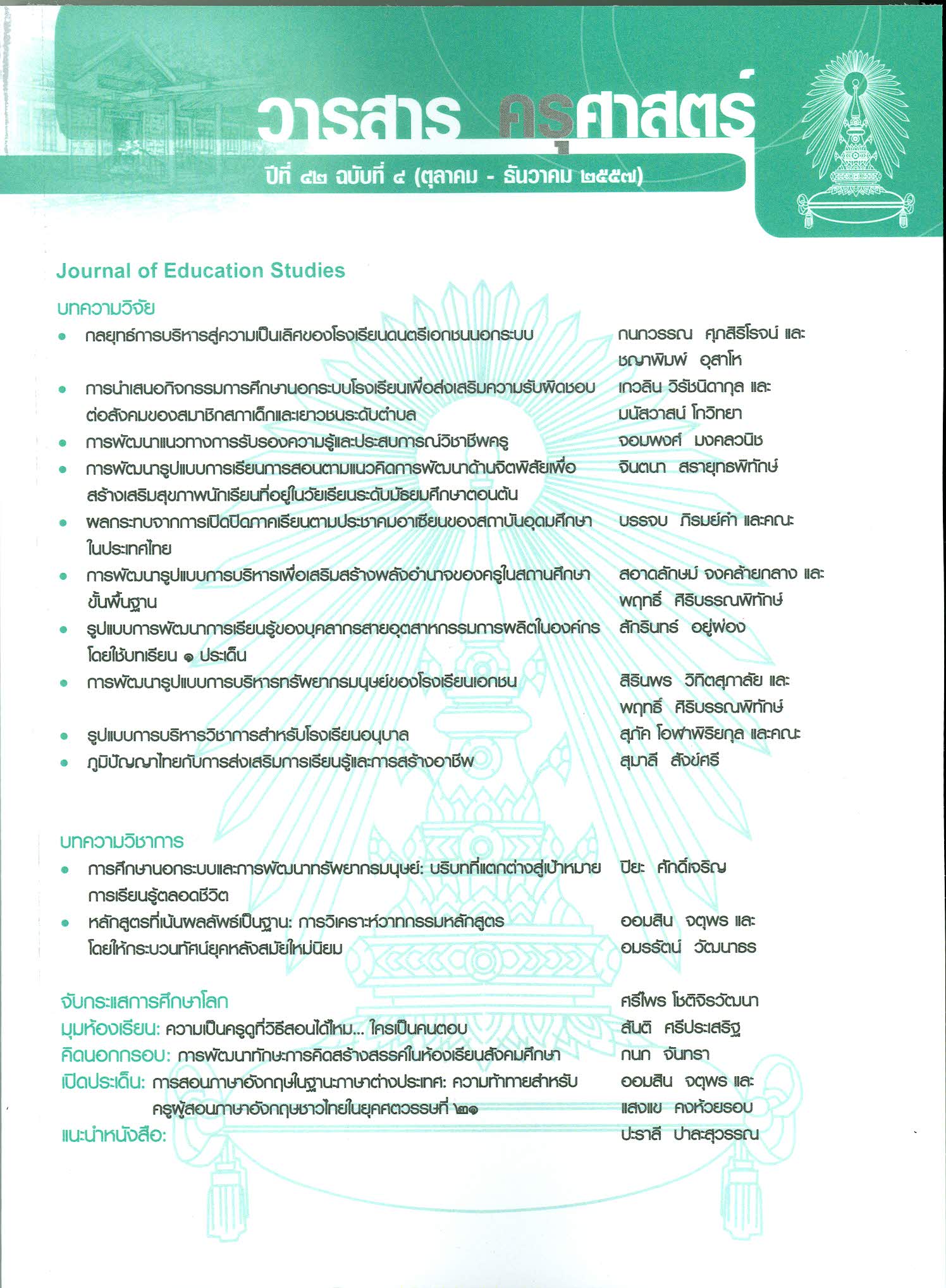หลักสูตรที่เน้นผลลัพธ์เป็นฐาน : การวิเคราะห์วาทกรรมหลักสูตร โดยใช้กระบวนทัศน์ยุคหลังสมัยใหม่นิยม Outcome-based curriculum: The discourse analysis of curriculum based on the postmodernism paradigm
Keywords:
หลักสูตรที่เน้นผลลัพธ์เป็นฐาน, วาทกรรมหลักสูตร, กระบวนทัศน์ยุคหลังสมัยใหม่นิยม, OUTCOME-BASED CURRICULUM, CURRICULUM DISCOURSES, POSTMODERNISM PARADIGMAbstract
บทความฉบับนี้มุ่งนำเสนอประเด็นเชิงวิพากษ์ในศาสตร์ด้านหลักสูตร ได้แก่ ๑) หลักสูตรคือ ผลลัพธ์การเรียนรู้: มุมมองหลักสูตรตามกระบวนทัศน์ยุคสมัยใหม่นิยม และ ๒) ประเด็นเชิงวิพากษ์หลักสูตร ที่เน้นผลลัพธ์เป็นฐานและแนวทางใหม่ของการวิจัยในศาสตร์ด้านหลักสูตร การนำกระบวนทัศน์ยุคหลัง สมัยใหม่นิยมมาใช้วิเคราะห์วาทกรรมหลักสูตรที่เน้นผลลัพธ์เป็นฐานเพื่อให้นักวิชาการด้านหลักสูตรและ นักการศึกษาเกิดมุมมองเชิงวิพากษ์และมองเห็นแนวทางการศึกษาวิจัยในศาสตร์ด้านหลักสูตรที่มี ความหมายครอบคลุมและสัมพันธ์กับความหมายของคำว่า “การศึกษา” และที่สำคัญศาสตร์ด้านหลักสูตร ในปัจจุบันเกิดการเปลี่ยนถ่ายกระบวนทัศน์ จากที่เคยถูกครอบงำโดยกระบวนทัศน์การบริหารจัดการทาง วิทยาศาสตร์ ซึ่งให้ความสำคัญกับกระบวนทศั นก์ ารพัฒนาหลักสูตรกลายเปน็ กระบวนทัศนท์ ี่มีความสำคัญ น้อยลง โดยกระบวนทัศน์การทำความเข้าใจหลักสูตรกลายเป็นกระบวนทัศน์ที่เข้ามาแทนที่ในฐานะที่เป็น วาทกรรมหลักสูตรร่วมสมัย ซึ่งส่งผลต่อแนวทางใหม่ของการวิจัยในศาสตร์ด้านหลักสูตร ได้แก่ การศึกษา อัตชีวประวัติและการวิจัยแนวเรื่องเล่า
The article aimed to propose critical issues in the field of curriculum studies as follows: 1) Curriculum as learning outcomes: the perspective toward curriculum based on the modernism paradigm and 2) the critical issues of an outcome-based curriculum and a new approach to educational research in the field of curriculum studies. The postmodernism paradigm was used to analyze the discourse on the outcome-based curriculum in order for curriculum scholars and educational specialists to have critical perspectives and recognize the approach to educational research in the field of curriculum studies which have a broader meaning and are related to the meaning of “education”. More significantly, the paradigm shift has occurred in the contemporary field of curriculum studies from the predominantly scientific management paradigm which had placed an emphasis upon the curriculum development paradigm and has since become less important. This was replaced by the curriculum understanding paradigm as a contemporary curriculum discourse. The discourse has had influences upon the new approach to educational research in the field of curriculum studies such as autobiography and narrative inquiry.




